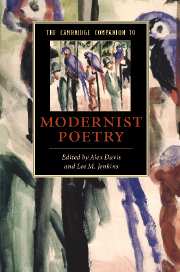Book contents
- Frontmatter
- Introduction
- Part I: Contexts
- Part II: Authors and Alliances
- 5 Pound or Eliot: whose era?
- 6 H.D. and revisionary myth-making
- 7 Yeats, Ireland and modernism
- 8 Modernist poetry in the British Isles
- 9 US modernism I: Moore, Stevens and the modernist lyric
- 10 US modernism II: the other tradition - Williams, Zukofsky and Olson
- 11 The poetry of the Harlem Renaissance
- 12 Caliban’s modernity: postcolonial poetry of Africa, South Asia and the Caribbean
- Part III: Receptions
- Guide to further reading
- Index
- Series List
12 - Caliban’s modernity: postcolonial poetry of Africa, South Asia and the Caribbean
from Part II: - Authors and Alliances
Published online by Cambridge University Press: 28 November 2007
- Frontmatter
- Introduction
- Part I: Contexts
- Part II: Authors and Alliances
- 5 Pound or Eliot: whose era?
- 6 H.D. and revisionary myth-making
- 7 Yeats, Ireland and modernism
- 8 Modernist poetry in the British Isles
- 9 US modernism I: Moore, Stevens and the modernist lyric
- 10 US modernism II: the other tradition - Williams, Zukofsky and Olson
- 11 The poetry of the Harlem Renaissance
- 12 Caliban’s modernity: postcolonial poetry of Africa, South Asia and the Caribbean
- Part III: Receptions
- Guide to further reading
- Index
- Series List
Summary
Readers of a book on modernist poetry may be surprised to find in it an essay on the English-language poetry of the so-called developing world. W. B. Yeats, T. S. Eliot, Gertrude Stein, Mina Loy, Jean Toomer - yes, no doubt. But the Jamaican Louise Bennett, the Nigerian Wole Soyinka, the Kashmiri Agha Shahid Ali? Surely to call these poets 'modernists' would be to commit what philosophers call 'a category mistake', to misattribute properties, to confuse classifications? Or perhaps, as Monsieur Jourdain in Molière's Le Bourgeois Gentilhomme didn't realise he had been speaking prose all his life, have these 'Third World' poets been modernists all along without being noticed?
Geography helps explain this appearance of a category mistake. Anglophone modernism - conceived as a literary response to the anonymity, stress and speed of modern life - is usually attributed to 'First World' cities from London and Dublin to New York and Chicago. Way off the canonical map of English-speaking modernism are the colonial outposts of European empires, except as sites from which adventurous poets and artists are seen as importing primitive or exotic materials to shore against their ruins.
A second reason for the seeming oddity of critically conjoining modernism and postcolonialism is historical. Most period-based conceptions of literary modernism locate it in the first half of the twentieth century, and postcolonial poetry, so called because of its emergence during and in the aftermath of European colonialism, flourished for the most part in the second half, post the post-Second World War decolonisation of these regions.
- Type
- Chapter
- Information
- The Cambridge Companion to Modernist Poetry , pp. 207 - 222Publisher: Cambridge University PressPrint publication year: 2007
- 1
- Cited by

